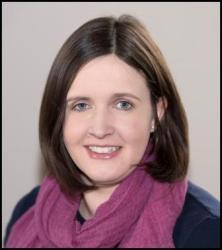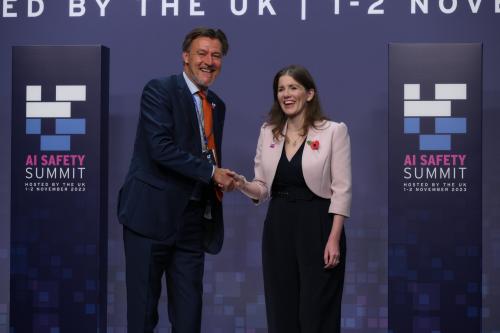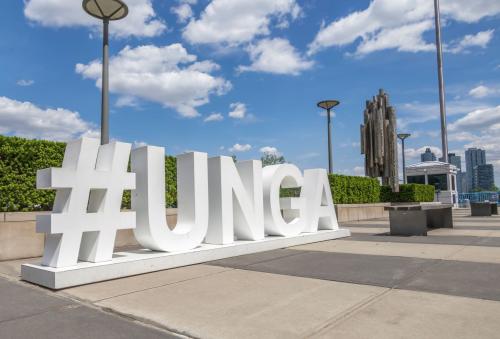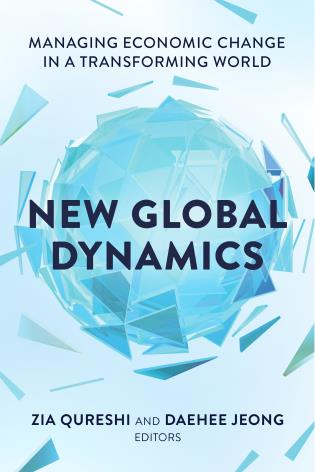Content from the Brookings Doha Center is now archived. In September 2021, after 14 years of impactful partnership, Brookings and the Brookings Doha Center announced that they were ending their affiliation. The Brookings Doha Center is now the Middle East Council on Global Affairs, a separate public policy institution based in Qatar.
The Middle East and North Africa (MENA) region is an intriguing site for transitional justice research. It presents classic transitional justice scenarios and demands while also challenging some of the field’s very foundations. Yet, ongoing political instability and conflict render the region largely inaccessible to academic researchers from the Global North, and so the question that arises is how do we engage in research on a region with which direct contact and experience are limited? I have been interested in transitional justice in the Middle East for many years, and have struggled with this question of how to properly understand justice demands without deep engagement with the region and its people. So, I was delighted and privileged to be invited to participate in the Brookings Doha Center workshop, “Innovation in Transitional Justice: Experiences from the Arab Region”, in Qatar in March 2020.
For many years, I have worked with women from the MENA region on the subject of transitional justice. This work has involved helping them to think about how to use the international lingua franca to advocate for their own transitional justice demands in law and policy. From these interactions, I have developed a reasonable understanding of some of the difficulties that arise when using the existing tools in the transitional justice “toolbox” to address the MENA region’s specific challenges. Conversations about transitional justice mechanisms inevitably reveal frustration about their limitations and the inability to capture the demands of affected communities. So, as I prepared for my trip to Doha to participate in the workshop, I caught up on background reading about regional developments in transitional justice, I reflected on what I understood to be the challenges, but most importantly, I prepared myself to listen. I prepared to set aside any preconceptions that I had about the subject and pay heed to those who were most closely affected by conflict in the region, and who were leading the way in developing transitional justice-based responses.
My expectations for the workshop had been high, and I was not disappointed. I sat. I listened. I learned. But one experience that I had not been prepared for was that at times I felt deeply uncomfortable by my presence in the room. In some ways, this was straightforward to explain. There were only a small number of us who were not from the region and did not speak Arabic. And yet, when we spoke or participated in the discussion the whole room switched to communicating exclusively in English. English to Arabic interpretation was available to mediate these interactions, but the fact remained that those conversations were refracted through layers of translation as a result, and this process always carries the risk that subtlety and nuance are lost or altered.
In other ways, the feeling of discomfort was deeper. What right had I to be a part of that conversation? How did my status as an academic from a Northern elite institution grant me access to a conversation about a region of which I have no lived experience? I am a theorist of transitional justice. I am uncomfortable with the idea of “expertise” that confers greater legitimacy on outside researchers than on those with an inherent understanding of the conflict and the challenges of defining justice. In some ways, I felt as if I was an outsider to a deeply personal conversation. And so, I found myself reflecting on why I was there — confronted more starkly than ever before by my position within this problematic hierarchy between the “researcher” in the Global North and the “researched” in the Global South. It was an uncomfortable place to be.
From this process of reflection, a number of questions arose in my mind about research in this field.
First, there is an assumption in Northern discourse that there is a transition and as a result, a political regime that is interested (even instrumentally) in the pursuit of justice. Current models have little to say about how to “do” transitional justice in a context where the state and its institutions are openly hostile to such demands. In the Northern context, justice demands are mostly tolerated, even where states do not engage meaningfully in the debate or create institutions and mechanisms. Researchers and advocates can speak freely. This is not a privilege that can be taken for granted. For many in the MENA region, transitional justice advocacy carries real physical risk. Strategies for engagement are necessarily different. For those of us who take physical security for granted, this is an aspect of transitional justice advocacy, which we must pay attention to and learn about.
Second, the way in which scholars in the Global North read and understand the events that give rise to the need for transitional justice is refracted through the prism of Northern understandings and experiences of what justice is and how it can be achieved. This is evidenced by the way in which international interventions in Egypt and Tunisia have been critiqued as designing transitional justice policy based on Northern assumptions about what is required rather than on indigenous demands. At the workshop, it was interesting to hear debate between participants on the extent to which internationally backed transitional justice mechanisms had been appropriate for the context. These debates reveal the way transitional justice policy relies on the possibility of shared understandings of justice that are not always present. There are undoubtedly areas of shared experience and challenges, where insight from one case might be useful for another. However, this exchange is currently structured in a hierarchical manner, in which “knowledge” imported from experts is privileged over the experiential expertise of those from the region. An equitable model would treat this exchange with more humility, and recognition of shared experience and learning rather than expertise.
Finally, there is the question of language. Northern conventions currently determine both the scope of the research questions that can be asked and the language in which messages must be disseminated. As with my experience at the workshop, this dynamic operates on explicit and implicit levels. The implicit requirement that the Global South must speak to us in a language that we understand to gain access to spaces of influence creates a powerful barrier to the dissemination of work of local activists/researchers internationally. This in turn leads to a reliance on unequal partnerships to tell stories and amplifies voices outside the region. But the problem is deeper than the simple requirement to speak or publish in English. In the process of translation, subtlety and nuance are lost. This can relate to language, to the different techniques of communication engaged in by researchers and activists, or to the element of cultural “translation,” whereby those from outside of the region alter messages to suit the listener. For example, the term “justice” is often understood in international discourse to include elements of reconciliation. And yet, this was not an understanding of the term that was shared by participants from Syria. The translation of justice demands must carefully convey its meaning for those to whom it is due, and not be molded to fit a model that those from the North recognize. The problem of common terms with varying interpretations is not an easy problem to overcome, but it needs to be acknowledged.
Knowledge hierarchies determine the way justice demands are framed. To access international support and funding, research and advocacy must be designed to conform to certain set expectations concerning the form and function of transitional justice. This makes it recognizable to international funders and reviewers. This process neither accommodates alternative ways of defining the problem nor creates space for developing new ways of addressing it. This dynamic is particularly notable in the researcher and activist distinction, which underpins many of the funding rules. While there may be a neat separation between a researcher and activist in the North, in most other regions this distinction is not sustainable.
In my experience, rules that require researchers from the Global South to conform to the same patterns and styles of those in the Global North are inherently exclusionary and inhibit meaningful and equal collaboration. In the context of transitional justice, while the core of the field is so closely guarded by its international gatekeepers there is little possibility of innovation in the Arab world, or for the region to meaningfully shape the discourse of transitional justice per se. Transitional justice is assessed as having either succeeded or failed based on existing criteria, rather than on creating new directions for assessing the meaning and value of justice for affected communities.




Commentary
Op-edThe view from an ‘outsider’: Reflections on North-South collaboration on transitional justice policy and research
Monday, November 23, 2020